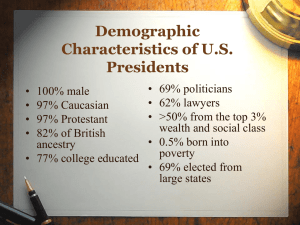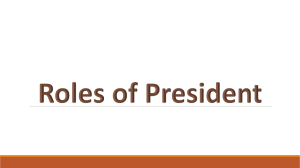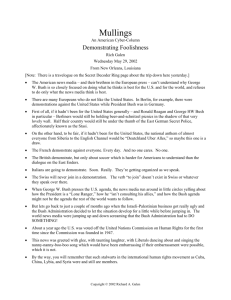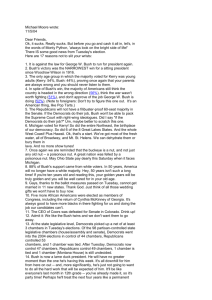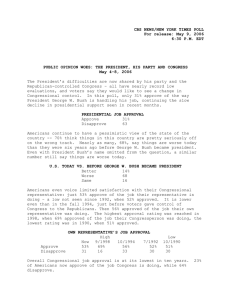Associated Press 01-19-07 Analysis: Bush Making Concessions
advertisement
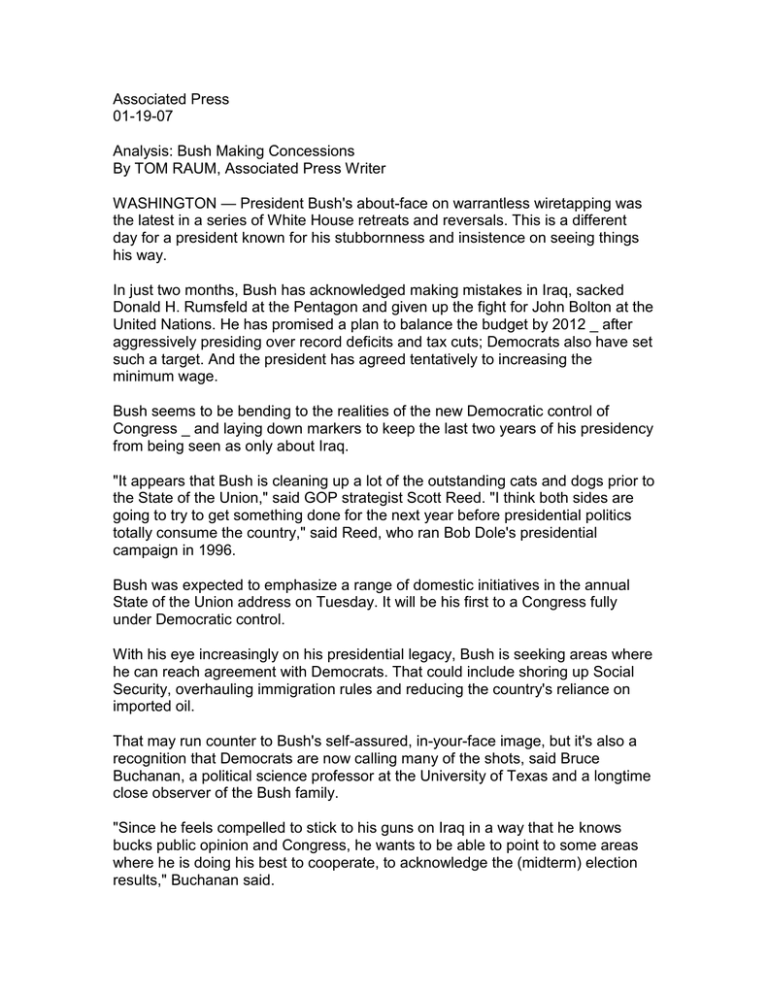
Associated Press 01-19-07 Analysis: Bush Making Concessions By TOM RAUM, Associated Press Writer WASHINGTON — President Bush's about-face on warrantless wiretapping was the latest in a series of White House retreats and reversals. This is a different day for a president known for his stubbornness and insistence on seeing things his way. In just two months, Bush has acknowledged making mistakes in Iraq, sacked Donald H. Rumsfeld at the Pentagon and given up the fight for John Bolton at the United Nations. He has promised a plan to balance the budget by 2012 _ after aggressively presiding over record deficits and tax cuts; Democrats also have set such a target. And the president has agreed tentatively to increasing the minimum wage. Bush seems to be bending to the realities of the new Democratic control of Congress _ and laying down markers to keep the last two years of his presidency from being seen as only about Iraq. "It appears that Bush is cleaning up a lot of the outstanding cats and dogs prior to the State of the Union," said GOP strategist Scott Reed. "I think both sides are going to try to get something done for the next year before presidential politics totally consume the country," said Reed, who ran Bob Dole's presidential campaign in 1996. Bush was expected to emphasize a range of domestic initiatives in the annual State of the Union address on Tuesday. It will be his first to a Congress fully under Democratic control. With his eye increasingly on his presidential legacy, Bush is seeking areas where he can reach agreement with Democrats. That could include shoring up Social Security, overhauling immigration rules and reducing the country's reliance on imported oil. That may run counter to Bush's self-assured, in-your-face image, but it's also a recognition that Democrats are now calling many of the shots, said Bruce Buchanan, a political science professor at the University of Texas and a longtime close observer of the Bush family. "Since he feels compelled to stick to his guns on Iraq in a way that he knows bucks public opinion and Congress, he wants to be able to point to some areas where he is doing his best to cooperate, to acknowledge the (midterm) election results," Buchanan said. As governor, Bush earned an early reputation for successfully reaching out to Democrats who controlled the Texas Legislature. But, said Buchanan, the Democrats in Texas were centrist business Democrats whose goals often meshed with Bush's, a situation not matched in Washington. The abrupt retreat from warrantless eavesdropping of calls between the U.S. and overseas appeared designed to head off certain confrontations with Congress and federal courts. After claiming for months it had the authority to order such spying, the administration now says it will let an independent panel of federal judges oversee the program. The turnabout raised fresh questions about other post Sept. 11 anti-terror policies that appear to push the constitutional envelope, including secret CIA prisons overseas and the continued existence of the prison camp for suspected terrorists in Guantanamo Bay, Cuba. "The government is again one of checks and balances," said Steffen Schmidt, a political scientist at Iowa State University. "The fact that the Democrats won and will scrutinize his policy, investigate his decisions and say `no' to things means he has to essentially be a president in a different way than when he had a compliant Republican Congress for six years." Bush was drawing criticism even from within his own party over the domestic spying program, initiated soon after the attacks of Sept. 11, 2001, and first disclosed in December 2005 by The New York Times. "The United States and the administration have paid a heavy price for not acting sooner to bring the terrorist surveillance program under judicial review," Sen. Arlen Specter of Pennsylvania told Attorney General Alberto Gonzales at a sometimes testy Senate Judiciary Committee hearing on Thursday. Specter is the panel's senior Republican. Sen. Patrick Leahy, D-Vt., the chairman, asserted that, in his more than 30 years in the Senate, he never had seen a time when the constitutional and fundamental rights of Americans "were more threatened, unfortunately, by our own government." Until the turnabout, the administration argued strenuously that the president possessed extraordinary legal powers because of the need to protect the country after the Sept. 11 attacks. The warrantless spying program was part of a campaign spearheaded by Vice President Dick Cheney, who argued that many presidential powers had been eroded by Congress in response to the Vietnam War and the Watergate scandal. Cheney defended the program as recently as Sunday in a television interview. The White House denied that Bush's recent concessions to Congress were a sign of political weakness. "A lot of people are looking for a `panic' or `failure' narrative out of this White House. It's just not the case," said presidential press secretary Tony Snow.
